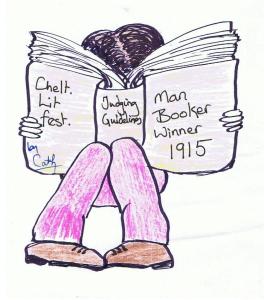It seems like the Cheltenham Literary festival has some special deal with someone when it comes to weather. Once again, the event was bathed in such warm sunlight that I wondered if I shouldn’t be calling in to the Lido.
I was there for a fantasy event: if there had been a Booker award in 1945, which book might have won it. The festival invited a panel of five writers to debate this in public, each author being set to champion one of the titles. The line up was:
- AS Byatt for Elizabeth Taylor’s At Mrs Lippencote’s
- Rafaella Barker for Elizabeth Smart’s By Grand Central Station I sat down and Wept,
- Akalla for George Orwell’s Animal Farm
- Rachel Johnson for Nancy Mitford’s The Pursuit of Love
- Alexei Sayle for Evelyn Waugh’s Brideshead Revisited.
 I thought that this year the choice was trickier than the one I watched last year, when two of the contenders had seemed rank outsiders. Or perhaps, because then I’d gone along anticipating The Good Soldier was the only possible winner, I had more of a commitment to the debate.
I thought that this year the choice was trickier than the one I watched last year, when two of the contenders had seemed rank outsiders. Or perhaps, because then I’d gone along anticipating The Good Soldier was the only possible winner, I had more of a commitment to the debate.
This year, I had not done all of my homework. A couple of weeks ago I finally got round to reading Brideshead Revisited, but there were two on the list that I hadn’t read, or tracked down as second hand copies.
I know, I should have gone out and bought them new. The Taylor, at any rate, would have been a useful addition to the shelf I’m gradually giving over to her writings. But the last few weeks have been busy, and I kept putting that trip to town off. So I read the little that was available free of each of them on-line and had my preconceptions confirmed.
Taylor’s opening intrigued, and drew me in…
‘Did the old man die here? What do you think?’ Julia asked, as her husband began to come up stairs.
‘Old man? What old man?’
She stood on the shadowy landing with its six white doors.
‘What old man,’ asked Roddy once more, coming up and putting his arm along her shoulders.
‘The husband. Mr Lippincote. Oh how I wish we needn’t live in other people’s houses.’
‘What if he did?’
Yes, what indeed? The dead cannot communicate with the living, or do harm to them.
If there had been more available than the tantalising first ten pages I would have read on. Note to self: must put this on my Christmas list.
Note 2: no ditto on Elizabeth Smart’s novel.
It’s taken me a long time to reach the point where I know when to give up on a book, and this one will go on that fairly short list. Even the rather passionate advocacy of Rafaella Barker could not move me to go back and read more of this:
I am standing on a corner in Monterey, waiting for the bus to come in, and all the muscles of my will are holding my terror to face the moment I most desire. Apprehension and the summer afternoon keep drying my lips, prepared at ten-minute intervals all through the five hour wait.
On stage, there was some debate about the merits of poetic prose, but the agreement of the whole panel seemed to be that the novel has no narrative line.
I had it in mind that this one should be the first to fall, and it was offered up for the first round of votes, along with Mrs Lippincote’s, but it was Taylor’s novel that went out at the first round, while Elizabeth Smart’s made it through to the last. Two days later and I’m still not clear how this could have happened.
I hadn’t enjoyed Brideshead Revisited, it seemed lacking in heart. But, if I had to choose between Smart’s description of a love affair or Waugh’s, I’d opt for the latter, despite its slow start, and off-key ending. Not so the panel, who dropped him.
As they did, The Pursuit of Love. Well, it’s a nice book, a funny book, but I would have been surprised to see it win. So, the last two books standing were Animal Farm and By Grand Central Station I Sat Down and Wept.
Interestingly, these were the books whose advocates had given the most passionate opening arguments, and perhaps that’s why the rest of the panel fell away. All had offered literary accounts of their chosen novels, but the first three had lacked the engagement with their texts that Akalla had for Animal Farm, or Rafaella Barker for By Grand Central Station…
It was obvious that their books had touched them. They did not just admire the writing, they loved it. And for that reason, I’m thinking that though Smart’s novel did not, in the end win, I ought to give it a second chance, and read it through to the end.
After all, I could borrow it from the library, I don’t have to put it on a Christmas list.



